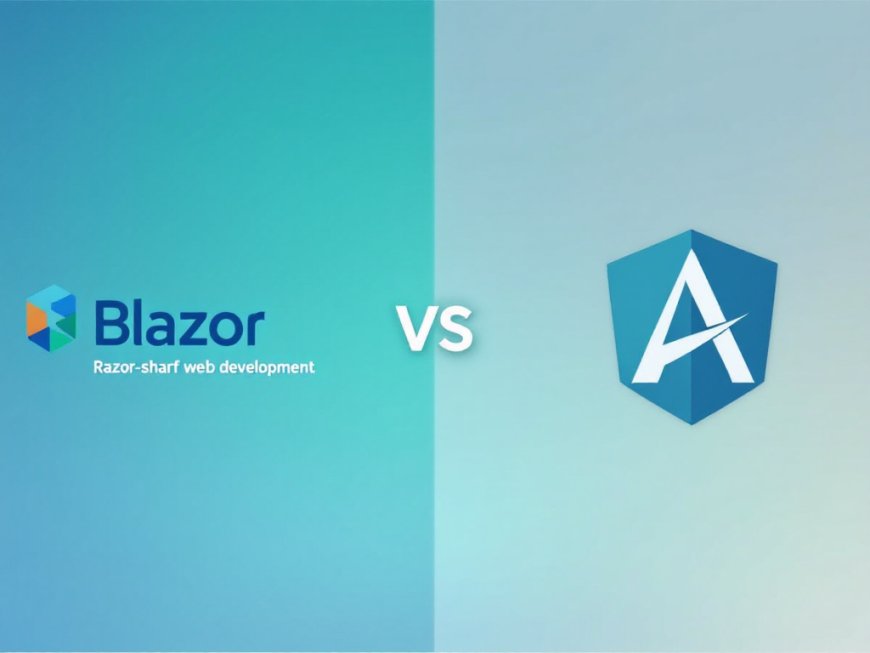Blazor vs Angular: What's Best with .NET Backend?

When building modern web applications, choosing the right front-end framework is crucial for project success. Two popular options for developers working with a .NET backend are Blazor and Angular. Both frameworks offer robust capabilities, but determining which is best for your specific project requires careful consideration. If you're pursuing .net industrial training, understanding these frameworks becomes essential for your career growth. Developers often face challenging .net core interview questions for experienced professionals about these technologies, making it important to grasp their fundamental differences and integration capabilities.
In this comprehensive comparison of Blazor vs Angular: What's Best with .NET Backend?, we'll explore the strengths, weaknesses, and unique features of each framework to help you make an informed decision for your next web development project.
The Rise of Modern Web Frameworks with .NET
The web development landscape has evolved dramatically in recent years, with .NET developers enjoying more front-end options than ever before. Microsoft's introduction of Blazor has given developers a way to write C# code for both server and client-side applications, while Angular continues to be a powerful TypeScript-based alternative with excellent .NET integration capabilities.
Understanding Blazor: Microsoft's Web Framework Revolution
Blazor represents Microsoft's innovative approach to web development, allowing developers to build interactive web UIs using C# instead of JavaScript. This framework comes in two flavors:
Blazor Server
Blazor Server executes your application's C# code on the server, sending UI updates to clients through SignalR connections. This approach offers several advantages:
-
Fast initial load times
-
Minimal client-side requirements
-
Immediate access to server-side resources
-
Lower complexity for developers familiar with .NET
However, it requires a constant connection to the server and may experience latency issues with complex applications or slower connections.
Blazor WebAssembly
Blazor WebAssembly runs entirely in the browser using WebAssembly technology. Its key features include:
-
Offline capability after initial download
-
Reduced server load
-
Client-side execution similar to JavaScript frameworks
-
Cross-platform compatibility
The trade-off is a larger initial download size and potentially slower startup performance compared to pure JavaScript solutions.
Angular: The Enterprise-Grade Framework
Angular, developed and maintained by Google, is a comprehensive TypeScript-based framework for building client-side applications. When considering Blazor vs Angular: What's Best with .NET Backend?, Angular offers:
Component-Based Architecture
Angular's architecture revolves around modular components that encapsulate templates, logic, and styling:
-
Reusable UI elements
-
Clear separation of concerns
-
Enhanced testability
-
Standardized structure for large teams
Full-Featured Development Ecosystem
Angular provides a complete development ecosystem including:
-
Angular CLI for project scaffolding and management
-
RxJS for reactive programming
-
Angular Material for UI components
-
Comprehensive routing system
-
Built-in form validation
Mature Tooling and Community Support
As one of the most established front-end frameworks, Angular benefits from:
-
Extensive documentation
-
Large community support
-
Proven enterprise adoption
-
Regular updates and long-term support
Integration with .NET Backend: Key Considerations
When evaluating which framework works best with a .NET backend, several factors come into play:
Development Experience and Knowledge Transfer
Blazor allows .NET developers to leverage existing C# skills across the entire stack, reducing the context switching between languages. This can significantly accelerate development for teams already proficient in .NET technologies.
Angular, while requiring TypeScript knowledge, provides a well-structured approach that many .NET developers find complementary to their backend work. The strong typing system in TypeScript often resonates with C# developers.
Authentication and Security
Both frameworks integrate well with ASP.NET Core Identity and other authentication providers, but their approaches differ:
-
Blazor Server operates within the ASP.NET Core pipeline, making authentication seamless
-
Blazor WebAssembly requires configuration for secure API calls
-
Angular typically uses JWT tokens or OAuth flows with .NET APIs
API Communication
The method of communicating with your .NET backend varies between frameworks:
-
Blazor can directly access server resources (in Server mode) or use HTTP clients
-
Angular exclusively uses HTTP clients to communicate with REST or GraphQL endpoints
Performance Comparison: Blazor vs Angular
Performance considerations often influence the choice between Blazor vs Angular: What's Best with .NET Backend?. Each framework has distinct performance characteristics:
Initial Load Time
-
Blazor Server: Fast initial load with minimal client-side resources
-
Blazor WebAssembly: Larger initial download that includes the .NET runtime
-
Angular: Moderate initial load that can be optimized through lazy loading
Runtime Performance
-
Blazor Server: Depends on network latency and server resources
-
Blazor WebAssembly: Improving but still not as fast as native JavaScript in complex scenarios
-
Angular: Highly optimized with efficient change detection and rendering
Scalability
Angular has proven scalability in large enterprise applications with thousands of components. Blazor is still evolving in this area but shows promise, especially with Server-side rendering for complex applications.
Development Workflow and Tooling
Blazor Development Experience
Blazor integrates natively with Visual Studio and the .NET ecosystem:
-
Unified debugging between front-end and back-end
-
Seamless deployment with ASP.NET Core projects
-
Familiar package management with NuGet
-
Growing component ecosystem
Angular Development Experience
Angular development typically involves:
-
Angular CLI for project management
-
npm for package management
-
Separate build processes from the backend
-
Rich third-party component libraries
Making the Decision: When to Choose Each Framework
The decision between Blazor and Angular should align with your project requirements and team capabilities.
Choose Blazor When:
-
Your team has strong .NET/C# skills but limited JavaScript experience
-
You need tight integration with .NET libraries and services
-
You want to minimize context switching between languages
-
Your application has significant server-side processing needs
-
Progressive Web App (PWA) capabilities are needed
Choose Angular When:
-
Your project requires a mature, battle-tested framework
-
You need comprehensive client-side capabilities
-
Your team has TypeScript/JavaScript expertise
-
You're building a large-scale enterprise application
-
You need extensive third-party library support
Real-World Implementation Scenarios
Enterprise Application Development
For large-scale enterprise applications, the choice between frameworks often depends on existing infrastructure:
-
Organizations with established .NET ecosystems may benefit from Blazor's seamless integration
-
Companies with diverse technology stacks might prefer Angular's framework-agnostic approach
Start-up Projects
For new projects or startups:
-
Blazor offers rapid development when the team is already familiar with .NET
-
Angular provides a stable foundation with proven scalability for growing applications
Mobile and Progressive Web Apps
Both frameworks support PWA development, but with different approaches:
-
Blazor WebAssembly includes built-in PWA support
-
Angular offers extensive PWA capabilities through the Angular service worker
Future Outlook: Where Are These Frameworks Heading?
The web development landscape continues to evolve rapidly. When considering Blazor vs Angular: What's Best with .NET Backend?, understanding their trajectories can inform long-term decisions:
Blazor's Future
Microsoft continues to invest heavily in Blazor, with planned improvements including:
-
Better WebAssembly performance
-
Reduced download sizes
-
Native mobile capabilities through .NET MAUI
-
Enhanced JavaScript interoperability
Angular's Evolution
Angular maintains a predictable release schedule with incremental improvements:
-
Ivy rendering engine optimizations
-
Streamlined developer experience
-
Enhanced build performance
-
Expanded component libraries
Conclusion: Finding Your Best Fit
When evaluating Blazor vs Angular: What's Best with .NET Backend?, there's no universally correct answer. The best choice depends on your specific requirements, team composition, and project goals.
Blazor represents an exciting option for .NET developers seeking to extend their C# skills to the front-end, creating a unified development experience across the stack. Angular offers a mature, comprehensive framework with proven success in enterprise environments and excellent integration capabilities with .NET backends.
Consider starting with small proof-of-concept projects in both frameworks to evaluate their real-world performance and developer experience before committing to a full-scale implementation. Whichever framework you choose, both represent excellent options for modern web development with .NET backend services.
Frequently Asked Questions
How does the learning curve compare between Angular and Blazor?
For developers already familiar with C# and .NET, Blazor typically offers a gentler learning curve. Angular requires learning TypeScript and its extensive ecosystem, which can be more challenging initially but provides powerful capabilities once mastered.
Can I use component libraries with both frameworks?
Yes, both frameworks support component libraries. Angular has a mature ecosystem including Angular Material, PrimeNG, and many others. Blazor's component ecosystem is growing rapidly with options like Radzen, MatBlazor, and Syncfusion components.
How do debugging capabilities compare between these frameworks?
Blazor offers unified debugging through Visual Studio, allowing developers to set breakpoints in C# code across both client and server. Angular debugging typically happens through browser developer tools, with additional support from VS Code extensions.
Which framework is better for microservices architecture?
Both frameworks work well with microservices. Angular's clear separation from the backend makes it naturally suited for microservice architectures. Blazor Server requires more consideration for service boundaries but can still integrate effectively with proper design.
How do these frameworks handle state management?
Angular typically uses services, RxJS, or NgRx for state management. Blazor offers simpler state management through services and dependency injection, with libraries like Fluxor providing more complex state management patterns when needed.
What about SEO considerations for each framework?
Blazor Server and Angular Universal both support server-side rendering for improved SEO. Blazor WebAssembly requires additional configuration for SEO optimization but continues to improve with pre-rendering capabilities.
Can I gradually migrate from an existing application to either framework?
Yes, both frameworks support incremental adoption. Angular can be integrated into existing applications using Angular Elements. Blazor components can be added to existing ASP.NET MVC applications or even to JavaScript-based applications.
How do authentication and authorization compare?
Both frameworks integrate well with ASP.NET Core Identity. Blazor Server shares the authentication context with the server, while Blazor WebAssembly and Angular typically use token-based authentication with appropriate storage mechanisms.
Which framework is more suitable for real-time applications?
Blazor Server has built-in SignalR integration, making it excellent for real-time applications. Angular requires additional configuration with SignalR clients but offers robust real-time capabilities when properly implemented.
Do both frameworks support internationalization?
Yes, both frameworks provide internationalization support. Angular has built-in i18n capabilities, while Blazor leverages .NET's localization infrastructure for multi-language applications.
































































![https //g.co/recover for help [1-866-719-1006]](https://newsquo.com/uploads/images/202506/image_430x256_684949454da3e.jpg)
























![How Smart PMs Scale Their Careers in Any Org [TPG Live Recap]](https://tpgblog.com/wp-content/uploads/2025/06/2025-06-12-thumbnail-action.png?#)





















































